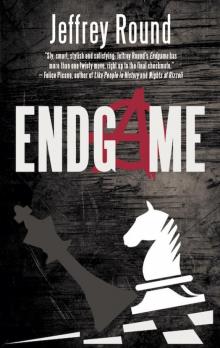- Home
- Jeffrey Round
After the Horses Page 6
After the Horses Read online
Page 6
“You’re a runner?” Dan asked.
“Yes, though I stopped being obsessive about it. I was up to ten k a day for a while. I’ve tapered back. I was neglecting Charles. Well, according to Charles, at least.”
“We should go running together sometime,” Dan said, hoping he wasn’t sounding flirtatious.
Lionel gave him an encouraging nod, as though to disarm the thought. “I’d like that.”
Charles came back into the room and glanced at the two of them.
“All good here?”
“Yes,” Lionel told him. “Dan’s going to take the case.”
Charles looked at Dan. “That’s great. Thank you.”
“I’ll do what I can,” Dan said.
They shook hands.
“We have to go,” Charles said. “Please keep us updated. You’ve got our numbers. Anything else you need to know, just ask.”
“I will,” Dan said. “Oh, one other thing. “I’ll need your permission to mention your names if I speak with the police.”
Charles looked alert. “What will that entail?”
“Simply that I’m talking to you. I won’t divulge anything sensitive.” Dan looked at the two faces staring at him. “In strictest confidence, of course, especially given the nature of the situation.”
“No, I can’t authorize that,” Charles said.
Dan waited. “Okay. But seeing how I’ll be working for you, I have to make sure I don’t step on anybody’s toes at headquarters. They don’t take kindly to outside investigations, as you can probably imagine.”
“I never really thought about it,” Lionel told him.
“Occupational hazard,” Dan said.
Charles shook his head. “Please keep our names out of it.”
“All right.” Dan nodded. “You have my promise. I won’t say or do anything to jeopardize either of you.”
Seven
Slow Train Coming
Dan’s day-timer lay open on his desk. The page was blacked out from 2:00 to 4:00 p.m. that afternoon, as it was every Tuesday. It was time for his weekly meet-up as he accompanied one of his oldest friends in the city while she endured her chemotherapy appointment.
He got in his car and headed downtown. No matter what time of day he arrived, shadows covered the outside of the hospital on Elizabeth Street, the least interesting of several medical buildings on hospital row, like a plain elder sister ignored in favour of her younger, prettier siblings.
The elevator was crowded with worried-looking faces. Dan imagined cartoon thought-bubbles over the heads of the various riders, with words like: Please God, I can’t live without him! Or This can’t be happening to me, or I hope she dies soon — I need the money.
They rose in silence as the elevator made its way to the sixth floor. A bell pinged and the doors opened.
“Chemo ward,” someone called out a little too cheerfully.
Several faces looked up, disconcerted by the announcement. They’d all breathe easier once the doors closed on them again, Dan knew. He made his way down the hall to a large room at the very end. Here the faces were grimmest of all. He recognized a few regulars, the stalwarts who came each week.
He saw Domingo’s shock of white hair over by the far wall. It hadn’t always been that colour, he recalled. It had grown in that way after the first round of chemo six years earlier. My first reprieve, she called it. This was her second.
At her side sat the stern, disapproving Adele. If Domingo was a playful balloon, her girlfriend Adi was the lead weight attached to its string. She exuded joylessness and disapproval at every opportunity. At least now, Dan thought, she had a reason for it.
While there were days when Dan didn’t think highly of human beings in general, Adi made a habit of disliking men explicitly at all times. Domingo, on the other hand, seemed to like everyone. She made being joyous her primary aim in life.
“I hate men,” Adi told Dan when they first met, whether as fair warning or a challenge to make her like him, he couldn’t tell.
“Any particular reason?”
“Because men oppress women. Because they’re violent. And because they run the world and they do it badly,” she answered.
“No argument there, but by that reasoning, we should hate all straights. They oppress us every day of our lives. The world is preset for heterosexuality. But oddly, I don’t hate them.”
“Maybe you’re a coward,” she said with a humourless smile.
Further discourse seemed pointless. Dan endeavoured to meet Domingo on her own after that. In fact, he’d spoken to Adele fewer than half a dozen times in all the years they lived in the same neighbourhood. Despite their disparate natures, however, the two women had remained together for more than twenty years. If nothing else, he would respect their love for one another.
Adele looked up at Dan and raised a finger to her lips, as though she would like to shush the entire world. She nodded over to the bed, where Domingo lay sleeping.
Domingo stirred as though she felt his presence. She opened her eyes and smiled. Dan went over and took her hand. Adele watched him like a guard dog watching a stranger approach its master.
“It’s okay, Ad. Why don’t you go have a coffee?”
Adele stood and looked down at Domingo.
“All right. I’ll be back in half an hour.”
Dan understood her reluctance. When your beloved is possibly in the last stage of life, you would want to be there every moment. On the other hand, the emotional toll it took was impossible to calculate. A coffee break would have to be a good thing at some point. She left with one last look around the room, as if she might later need to recount these details to a police officer asking for specifics of the last time she saw her partner alive.
Dan looked around. Chemical pouches were strung up on metal racks like plump purses on lean scarecrows. He sat on the edge of the bed and tried not look at the PICC line. On his first visit, Domingo showed him the port valve protruding from her right biceps. He flinched when she told him she had twenty-nine centimetres of plastic tubing embedded in her arm. During the course of treatment, the nurses cheerfully showed her the bags with her name affixed to labels, letting her know the timing for each solution. This bag will take forty-five minutes, the next one will only take thirty-five. Dan and Domingo sat together while the solutions drained silently into her body on the off-chance that a small percentage of the chemicals would target cancer cells and stem the tide of illness.
The room was hushed and dim, while the day outside was bright with the promise of spring. The sky seemed to beckon Dan onward, tempting him to run away rather than spend the afternoon in this theatre of sickness and death.
“So what’s the good news today?”
Domingo smiled. Her normally bronzed skin was pale and taut. She’d lost weight since their last visit.
“Glad you asked. My white cell count was up this morning.”
“Which means they let you do the chemo.”
“If you like to put it that way. I prefer to think of it as now I can’t get out of doing it.”
He nodded.
“Tell me how you’re feeling,” she said, as though he were the one to be concerned for. “How’s Ked? Everything okay at home?”
He knew she just wanted distraction. She didn’t care if he said anything relevant or simply rambled; it was all the same to her. She had little energy left over from the combined assault of cancer and the chemicals that made her shiver and feel cold all the time. She was grateful it was coming up to summer. At least it would be warm outside.
“Everything’s good. I got a couple of new clients today. Friends of Donny’s. He said to say hi.”
“Ah! The lovely Donny. Hi back from me.”
He filled in the details of the case for her.
“That’s good news,” she said. “I know your restless mind. You need to keep busy. Speaking of, how are you finding the meditations?”
Dan shrugged, half shy, half embarrassed. “Not tha
t great.”
Domingo studied his face. “Tell.”
He hesitated. He wasn’t about to admit he hadn’t done any of the exercises she had prescribed to counter the effects of a recurring post-traumatic stress disorder.
She sighed. “Look, Danny. You know this helps me, too, so don’t be stingy with the details.”
“Sorry, I forgot.”
“What about the dream? The one with the rusty pail with the hole in the bottom?”
It had haunted him, leaving him with a feeling of despair each night as he lifted the child’s pail and saw water gushing out.
“No, that one ended when I stopped dreaming about my mother. I can’t really remember any others.” He smiled hopelessly and shrugged. “Sorry, I’m useless. How about you? Anything good to tell?”
“Depends how you define good.”
“Good as in ‘positive,’ ‘encouraging.’”
“No. Not in that way.”
“Then what way?”
“These days it’s almost always the tunnel, following the train station.”
She’d told him when she had the first dream of a train, convinced it meant her cancer would recur. In fact, she was right. A month to the day, her test showed positive. Her prescience always unnerved him, to the point where he’d had to sever the friendship for a while, rekindling it only in the past few years.
“So you were on the train again?”
She nodded.
“Yes. I’m on the train and hesitating at the station, trying to decide whether to get off, but I wait too long and the train starts to move again. At first I feel panic, but then I realize it isn’t so bad. The train continues and in the distance I see a beautiful mountain. It looks like the train is going to crash right into the mountainside, but at the last moment a tunnel appears and the train is swallowed up in darkness.”
Her gaze was far off, looking at something over his shoulder.
“I can’t see a thing inside. All I can hear is the whistle screaming above as we race along in the darkness. Finally, the train throws a stray light ahead of it, illuminating everything in its path. That’s usually when I wake up.”
She’d had visions since she was a kid, insisting they were psychic insights into the future. She tried to describe them to him once. It’s like a door that opens and things flash past and I glimpse the scene inside before it closes again. She waved her hands before her eyes, indicating the door as it opened and closed again. Dan tried to joke with her. Was it big and wide or more like a narrow screen affair? Did it have a window at the top and a doorbell to one side? If there was a party going on when it opened, would you ask to be let inside? What about a sex scene, possibly accompanied by gasps and a rude slamming in her face?
She refused to let him put her off. It’s just what I see, she told him. More often than not, he had to admit there’d been validity to what she told him, even if it became apparent only with hindsight.
He was watching the change in her eyes, the leaden greyness coming in to chase out the light, the zombie reflexes that passively accepted the poison drop by drop. Absorbing, conquering her. Taking over her will until there was nothing left to fight with.
She smiled and reached for his hand.
“Old friend,” she said. “Thanks for being here.”
“I’m always here for you.”
“I know. I’m well taken care of. It’s Adele I worry about. If I go first, I don’t know what she’ll do. She acts tough, but she’s a softie inside.”
“Let’s worry about that when the time comes. For now, make sure you tell me if there’s anything I can do for you.”
“There’s only one thing. You already know what it is.”
She didn’t have to tell him: a decade earlier, her teenage son had gone missing. The boy, Lonnie, had shown signs of personality disorder at the time, though Domingo hadn’t fully understood the extent of the problem. He’d been experimenting with drugs and she put his strangeness down to that. Then he disappeared. Despite everything, he’d always been a loyal, loving son. There was no reason for him to vanish outright.
Dan pursued the case whole-heartedly at the time, but nothing came of it. Then he and Domingo had a falling out and he’d let it linger at the back of his filing cabinet. Now she lay in a hospital ward undergoing chemotherapy in a fight to save her life. It was time to reopen the investigation.
In the ensuing years, Domingo had convinced herself that her son was dead. No news was often not good news in Dan’s business, but it was a reason to stray on the side of hope rather than despair. Sometimes people went on hoping for years — the eternally optimistic — despite having nothing to go on. Maybe it was a talent for faith or just a better choice than premature grief. Domingo wasn’t one of those. She expected the worst, but mostly she wanted to know the truth before her health failed completely, another thing she was not optimistic about.
Right before he vanished, Domingo and Adele took Lonnie for counselling, but he refused to continue after a second visit. He claimed the doctors were purposely messing with his head and he wanted none of it. At her wit’s end, Domingo asked Dan to help. He tried talking to the boy. They’d always had a good rapport. Lonnie had looked after Ked on more than one occasion when Dan was strapped for a sitter. But by then Lonnie had gone from a friendly, outgoing boy to a sullen, suspicious young man. Dan said his bit then gave up. He could tell he wasn’t getting through to him. He concluded by reminding Lonnie he could always talk to Dan in confidence any time. A week later the boy left, taking with him a knapsack and a change of clothes. Not much to live on. They all thought he’d be back, but it was the last time anyone heard from him for months.
Then, nearly a year after vanishing, he called his mother out of the blue at Christmas from an area code just outside Quebec City. She told Dan he sounded disoriented, but managed to say he was living with a group of young people. He declined to say where he was exactly, but said he was happy. Two minutes later he was crying and telling her he missed her. Domingo begged him to come home, riveted by the fear that something terrible would happen if he didn’t. He refused. By the following year she was convinced he was dead. He’d come to her in a dream, she said. He was trying to fly, while all around him people were yelling, “Jump! Jump!” She watched him fall.
Since then the trail had dwindled to nothing. Lonnie had successfully disappeared, taking with him his burgeoning soccer skills, a drug habit, and whatever chemical imbalance was affecting his thinking. In the meantime, Dan sent out queries and requests for a follow-up. A few police contacts sent possible leads. All of them came to nothing. Dan tried another round of inquiries, but they too led nowhere. The trail had gone cold. Since then, nothing. Now, he was determined to try once again for his friend who lay dying in a hospital bed.
Dan looked up. The bags were empty.
The door opened. Adele was back with a rush of air, giving him the sour look she always had reserved for him. It was time to go.
Eight
Demimonde
On Tuesdays, Ked played basketball after school before going for pizza with his friends. Dan had no desire to eat alone, so he made his way to the gaybourhood upon leaving the hospital. His feelings were conflicted regarding the four square blocks that constituted his community. Some days he found them too shabby, too confining. Nothing that was easily defined, just that they were lacking in pizzazz. They needed more “Ooh-la-la!,” as Donny put it.
Dan’s former therapist suggested the nagging voice in his head was a reflection of his low self-esteem, making him hold the Church-Wellesley neighbourhood in parallel low regard. Self-hatred, self-inflicted homophobia. It was the psychology of being seen as a minority. Maybe, but Dan didn’t mind being a minority. He would happily declare that everyone is a minority of one sort or another. Just look hard enough and you’ll find the divide between you and every other human being who walks the earth, was his thinking. In any case, there wasn’t another community he could opt into if he opted out of th
is one. If wishes were horses, beggars would ride. Like it or not, this was his second home and he knew enough to be grateful for it, however begrudgingly.
Wandering north along Church Street, he could see the neighbourhood was changing again. He still recalled the days when the ghetto sprawled in from Yonge Street, stretching as far north as Isabella where two of the more popular bars, Chaps and Komrads, ruled. Back then there’d been little of note on Church, but rent was substantially cheaper than the gouging that went on elsewhere. In the space of a year, two new bars opened and the tide came east, helping create a unified neighbourhood with its first openly gay city councillor and a bi-weekly press. With unification came money, however, changing the tone and forcing out the smaller establishments, like the bookshops and clothing boutiques that couldn’t compete with bars and strip clubs. Wherever you went, there were always going to be winners and losers. The losers were the ones Dan missed most.
A decade earlier, he could have told you his favourite bar in the neighbourhood. No longer. His old haunts were gone. In a pinch, the Black Eagle served a purpose, and that purpose was to socialize lightly and sometimes meet a hook-up — seldom more — when the keening edge of loneliness came over him. If nothing else, on those long, lonely nights he could hang out unnoticed in its darker corners where his scruffy sex appeal hid its allure for the wrong sort. No matter how old he got, Dan discovered, there was always someone he wasn’t interested in trying to hit on him, even when he gave off all signals to the contrary.
Like it or not, he’d become a known commodity at the Eagle. If he stuck his face into the light long enough to be recognized, that is. The bartenders greeted him affably, joking about after-hours dates, which he always politely declined. Not a snob, he simply chose not to hang out with bar workers. He vividly recalled the days when one drink inevitably led to five or six or sometimes more, inebriation following in its wake. He hoped they were gone forever. He didn’t need to remind himself that risky sex had on occasion been a part of that dark picture. Somehow, little thanks to himself, he’d survived his youthful folly and looked forty in the eye without blinking. It seemed the edge of oblivion for most gay men, but he was grateful to have reached it.

 After the Horses
After the Horses Lion's Head Revisited
Lion's Head Revisited Shadow Puppet
Shadow Puppet Lake on the Mountain: A Dan Sharp Mystery
Lake on the Mountain: A Dan Sharp Mystery The God Game
The God Game Dan Sharp Mysteries 4-Book Bundle
Dan Sharp Mysteries 4-Book Bundle P'town Murders: A Bradford Fairfax Murder Mystery
P'town Murders: A Bradford Fairfax Murder Mystery Endgame
Endgame A Cage of Bones
A Cage of Bones